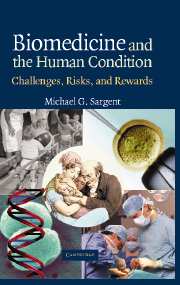Book contents
- Frontmatter
- Contents
- Preface
- 1 Challenges, Risks, and Rewards: Learning to Control Our Biological Fate
- 2 Learning to Breed Successfully
- 3 How Life is Handed On
- 4 Cells in Sickness and Health
- 5 Experiences in Utero Affect Later Life
- 6 Infection, Nutrition, and Poisons: Avoiding an Unhealthy Life
- 7 Signs of Ageing: When Renovation Slows
- 8 Cancer and the Body Plan: A Darwinian Struggle
- 9 Fighting Infection
- 10 Are Devastating Epidemics Still Possible?
- 11 Discovering Medicines: Infinite Variety through Chemistry
- 12 Protein Medicines from Gene Technology
- 13 Refurbishing the Body
- 14 Living with the Genetic Legacy
- 15 Epilogue: Signposts to “Wonderland”
- References
- Index
15 - Epilogue: Signposts to “Wonderland”
Published online by Cambridge University Press: 06 August 2009
- Frontmatter
- Contents
- Preface
- 1 Challenges, Risks, and Rewards: Learning to Control Our Biological Fate
- 2 Learning to Breed Successfully
- 3 How Life is Handed On
- 4 Cells in Sickness and Health
- 5 Experiences in Utero Affect Later Life
- 6 Infection, Nutrition, and Poisons: Avoiding an Unhealthy Life
- 7 Signs of Ageing: When Renovation Slows
- 8 Cancer and the Body Plan: A Darwinian Struggle
- 9 Fighting Infection
- 10 Are Devastating Epidemics Still Possible?
- 11 Discovering Medicines: Infinite Variety through Chemistry
- 12 Protein Medicines from Gene Technology
- 13 Refurbishing the Body
- 14 Living with the Genetic Legacy
- 15 Epilogue: Signposts to “Wonderland”
- References
- Index
Summary
In the developed world, human life expectancy has more than doubled in the last two centuries and is still increasing. The trend may not be sustainable, but life expectancy is evidently continually improving. Our bodies intrinsically lack the resources to provide foolproof maintenance long after our reproductive years, but our individual capacities are notably variable because of the heterogeneity of our genetic legacies and our life experiences. Even before birth, nutritional stress, toxic substances, and viral infections can have effects on the development of the foetus that will shorten an adult life span. After birth, accumulation of somatic mutations – sometimes originating in poor nutrition or chronic inflammation – creates a risk of cancer and other diseases of late middle age and may advance the ageing process. However, although our bodies may be unable to repair all biochemical damage, we can, in principle, reduce some of the risk to health and life expectancy it imposes.
New health challenges originating in life experience still emerge. Breast cancer, allergic reactions, and obesity are three very different kinds of health threat that are becoming increasingly common in the developed world. Breast cancer was well known before the twentieth century, but the lifetime risk of developing such a malignancy in Britain and the United States (and probably in many other countries) has now reached one in eight.
- Type
- Chapter
- Information
- Biomedicine and the Human ConditionChallenges, Risks, and Rewards, pp. 312 - 320Publisher: Cambridge University PressPrint publication year: 2005



